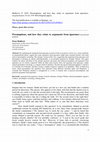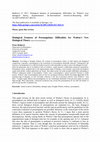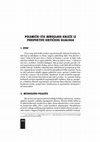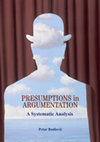Papers by Petar Bodlović
Informal Logic, 2024
The paper presents an extended scheme for the inference to the best explanation (IBE). The scheme... more The paper presents an extended scheme for the inference to the best explanation (IBE). The scheme precisely treats the epistemic modifiers (“hypothetically,” “plausibly,” “presumably”) of the inference, acknowledges its contrastive nature, clarifies the logical support between premises and conclusions (linked, convergent, and serial support), and introduces additional premises essential for inferring justified conclusions (especially those related to causal explanations and more demanding standards of proof). Overall, it advances the existing schemes for IBE in argumentation theory and treats IBE as a par excellence argumentative, rather than explanatory, form of reasoning.

Ethical Theory and Moral Practice, 2024
Moral progress is often modeled as an increase in moral knowledge and understanding, with achieve... more Moral progress is often modeled as an increase in moral knowledge and understanding, with achievements in moral reasoning seen as key drivers of progressive moral change. Contemporary discussion recognizes two (rival) accounts: knowledge-based and understanding-based theories of moral progress, with the latter recently contended as superior (Severini 2021). In this article, we challenge the alleged superiority of understandingbased accounts by conducting a comparative analysis of the theoretical advantages and disadvantages of both approaches. We assess them based on their potential to meet the following criteria: (i) moral progress must be possible despite evolutionary and epistemic constraints on moral reasoning; (ii) it should be epistemically achievable to ordinary moral agents; and (iii) it should be explainable via doxastic change. Our analysis suggests that both accounts are roughly equally plausible, but knowledge-based accounts are slightly less demanding and more effective at explaining doxastic change. Therefore, contrary to the prevailing view, we find knowledge-based accounts of moral progress more promising.
Proceedings of the Tenth Conference of the International Society for the Study of Argumentation, 2024
To what extent can the model of explanatory dialogue elucidate the interaction between the Doctor... more To what extent can the model of explanatory dialogue elucidate the interaction between the Doctor and diagnostic AI, i.e., Explainable Artificial intelligence (XAI)? We argue that explanatory dialogue models do not make an optimal framework for analyzing and evaluating the Doctor-XAI interaction. This is because this interaction, typically, does not aim at transferring understanding, a main goal of explanatory dialogue.

Prolegomena 23 (1), 2024
The paper provides an overview of contemporary argumentation theory, an academic discipline forme... more The paper provides an overview of contemporary argumentation theory, an academic discipline formed in the second half of the twentieth century by focusing on the discipline’s historical background, programmatic starting points, research subjects, and methodological tools. The argumentation theory is a heterogeneous discipline characterized, most generally, by logico-epistemological, rhetorical, and dialectical approaches. The historical overview describes the influence of Aristotle, Stephen Toulmin, Chaïm Perelman and Lucie Olbrechts-Tyteca, as well as Charles Hamblin on the formulation and development of the aforementioned approaches. The review of programmatic starting points introduces general pragmatic instructions on how to interpret and investigate arguments and describes the (alegged) limitations of traditional approaches to argument, mostly associated with formal logic. The paper’s central part discusses problems and methods of identification, interpretation, analysis, evaluation, and, finally, presentation of the argument. The overview primarily presents the theoretical contributions of dialecticians and informal logicians but also illustrates the practical applications of such contributions by analyzing a real-life argument from the Croatian media (about a possible infection with the coronavirus on Pag).
Pragmatics & Cognition, 2022
Traditionally, a presumption is a dialogically privileged, yet defeasible proposition that alloca... more Traditionally, a presumption is a dialogically privileged, yet defeasible proposition that allocates the burden of proof to a party who challenges it. This paper investigates the strength of presumptions. First, it explains how 'strength' contributes to defining the concept of presumption. Second, it provides an overview of (contextual, justificatory, and deontic) factors determining a presumption's strength. Finally, it analyses the predominant view that defines strength in terms of the Challenger's burden of proof: the stronger (weaker) the presumption p, the more (less) difficult it is to prove non-p. I argue that the latter proposal applies only to practical presumptions, and that strength is conceived differently for cognitive presumptions.

Argumentation
The study of presumptions has intensified in argumentation theory over the last years. Although s... more The study of presumptions has intensified in argumentation theory over the last years. Although scholars put forward different accounts, they mostly agree that presumptions can be studied in deliberative and epistemic contexts, have distinct contextual functions (guiding decisions vs. acquiring information), and promote different kinds of goals (non-epistemic vs. epistemic). Accordingly, there are "practical" and "cognitive" presumptions. In this paper, I show that the differences between practical and cognitive presumptions go far beyond contextual considerations. The central aim is to explore Nicholas Rescher's contention that both types of presumptions have a closely analogous pragmatic function, i.e., that practical and cognitive presumptions are made to avoid greater harm in circumstances of epistemic uncertainty. By comparing schemes of practical and cognitive reasoning, I show that Rescher's contention requires qualifications. Moreover, not only do practical and cognitive presumptions have distinct pragmatic functions, but they also perform different dialogical functions (enabling progress vs. preventing regress) and, in some circumstances, cannot be defeated by the same kinds of evidence. Hence, I conclude that the two classes of presumptions merit distinct treatment in argumentation theory.
Informal Logic, 2020
On the standard view, all presumptions share the same deontic function: they asymmetrically alloc... more On the standard view, all presumptions share the same deontic function: they asymmetrically allocate the burden of proof. But what, exactly, does this function amount to? Once presumptions are rejected, do they place the burden of arguing, the burden of explanation, or the most general burden of reasoning on their opponents? In this paper, I take into account the differences between cognitive and practical presumptions and argue that the standard accounts of deontic function are at least ambiguous (because two types of presumptions entail distinct conceptions of the "burden of proof"), and likely implausible. As a result, they require qualifications.

Argumentation, 2019
By explaining the argument from ignorance in terms of the presumption of innocence, many textbook... more By explaining the argument from ignorance in terms of the presumption of innocence, many textbooks in argumentation theory suggest that some arguments from ignorance might share essential features with some types of presumptive reasoning. The stronger version of this view, suggesting that arguments from ignorance and presumptive reasoning are almost indistinguishable, is occasionally proposed by Douglas Walton. This paper explores the nature and limits of the stronger proposal and argues that initial presumptions and arguments from ignorance are not closely connected. There are three main reasons. First, the argument from ignorance, unlike typical presumptive reasoning, is a negative kind of inference. Second, the typical initial presumption is sensitive to a broader set of defeaters and thus assumes a higher (negative) standard of acceptability. Third, in dialectical terms, initial presumption and argument from ignorance bring different attacking rights and obligations. I conclude that Waltonian intuition is unsupported or, at best, is limited only to practical presumptions and practical arguments from ignorance.
This paper investigates the relationship between practical and cognitive presumptions. It argues ... more This paper investigates the relationship between practical and cognitive presumptions. It argues that two types of presumptions come with different conceptions of strength. While the strength of a practical presumption is supposed to be correlated with the weight of rebuttal, the strength of a cognitive presumption is correlated with the degree of a proposition's plausibility. However, the degree of plausibility is not necessarily correlated with the weight of the burden of rebuttal.

According to Douglas Walton, the concept of presumption relates to both logical and dialogical co... more According to Douglas Walton, the concept of presumption relates to both logical and dialogical components. Logically, a presumption is the conclusion of a presumptive defeasible inference. Dialogically, the function of presumptions is to shift the burden of proof to the respondent in order to move the dialogue forward when the proponent, due to an objective lack of evidence, cannot present a sufficiently persuasive proposition. Presumptive status, assigned only at the argumentation stage of dialogue, is provisional: a particular presumption stands until further counter-indications are found. This paper points out some possible difficulties pertaining to Walton's dialogical model of presumption. Firstly, once a presumption's typical practical function is made precise, Walton's idea of presumption starts to lose its conceptual cohesion, thereby becoming applicable in the opening stage of dialogue, as well. Secondly, cohesion is lost also in practical contexts, since Walton's ''seat belts'' example might indicate that presumptions are not evidentially defeasible if the practical stakes are raised high enough. Most importantly, contextual evaluation may reveal that presumptions do not shift the burden of proof in any specific or genuine way.

In his 2003 article, Alvin Goldman outlined an epistemological explanation of the uses of enthyme... more In his 2003 article, Alvin Goldman outlined an epistemological explanation of the uses of enthymemes in interpersonal argumentation. The purpose of this paper is to explore its scope, necessity and limits in context of informal logic. Its adoption is hardly a necessity for informal logic, since the use of particular sort of enthymeme (where unexpressed premises relate to easily accessible evidence) can be explained by H. P. Grice's " Cooperative Principle " – valuable piece in the discipline's toolkit from the very beginning. Accordingly, if we are to adopt Goldman's proposal, there should be some instances of this type of enthymeme, successfully explained by his account, and left unexplained by Grice's account. But it's not at all clear if such instances can indeed be found. On the other hand, Goldman's proposal is limited to the use of this particular type of enthymeme, while it fails to explain the use of many other relevant types. It seems that in most cases Goldman's explanation won't work, and in those cases where it might – equally good explanation already exists. However, these narrow and modest concerns are not meant to be sufficient for a conclusive rejection of Goldman's approach as a whole.
Argumentacija (2011), written by academician Ivo Škarić, represents the first published attempt a... more Argumentacija (2011), written by academician Ivo Škarić, represents the first published attempt among Croatian authors to systematically investigate this area
of study. In the first part of the paper, I try to present the basic assumptions of Škarić’s theory of argument with the special emphasis on the concept and general structure of argumentation, as well as the possibility of argumentative discussion regarding value judgments. In the second part, I point to a certain number of theoretical, terminological and stylistic issues which, to my humble opinion, seriously limit the potential of Škarić’s work in becoming widely-used introductory textbook.

Cilj je ovog rada kratka analiza argumentacijskih sklonosti Miroslava Krleže koja je utemeljena n... more Cilj je ovog rada kratka analiza argumentacijskih sklonosti Miroslava Krleže koja je utemeljena na čitanju njegova polemičkog djela “Moj obračun s njima”. Kako bi bili jasni okviri u kojima se krećemo, u prvom se dijelu rada pokušava odrediti što je uopće polemika, kakva je njezina narav i u kakvoj je ona vezi s erističkim i kritičkim dijalogom. Iako je njezin prirodni parnjak u teoriji argumentacije eristički dijalog, pomno čitanje uvoda djela otkriva Krležine kritičke intencije. Sukladno interpretacijskoj dobrohotnosti primjerenije je Krležinu argumentaciju tumačiti iz normativne perspektive kritičke rasprave. Na taj se način pokušava odrediti njegova polemička narav: upućuju li sredstva koja se koriste u raspravi više na erističko “bezakonje” ili pak racionalno argumentiranje. U radu se brani teza kako je ipak riječ o prvome, i to s pomoću analize konkretnih primjera nepoželjnih argumentacijskih sredstava. Riječ je, ponajprije, o Krležinoj sklonosti argumentaciji ad hominem (koja uključuje vrijednosno konotirane izraze), zamjeni teza i banaliziranju te argumentima
ad populum i ad verecundiam.

Article aims to present a simple description of principle of charity (načelo milosrđa
) used in a... more Article aims to present a simple description of principle of charity (načelo milosrđa
) used in a context of rational argumentation. It tries to evince which are the common ways to formulate this principle and which problems are associated with each formulation. Principle of charity - one of the fundamental methodological tools in critical discussion - finds its origin in philosophy of language. Therefore I find appropriate to use the explanation of the principle in the latter discipline as a main topic introduction. After short introduction the principle of charity will be placed in the context of argumentation. Firstly, few of the general definitions will be discussed, and then the focus will move to different levels of its use. Principle is initially used while estimating the discourse; it also plays significant role in diagramming, argument reconstruction and estimating inferential standard. Second part of the article tries to systematize some objections that principle of charity can be faced with. Some critiques are quiet general (“idealism” of the human rationality as a false assumption; “context” as a term that doesn’t explain anything), and some are closely linked with its appliance on the different levels and in concrete situations. These objections are mostly invented by experts, but some of them are results of author’s critical intentions.
Drafts by Petar Bodlović
This text [Barišić's apologetics: In search of lost reason] is analysis of the quality of debate ... more This text [Barišić's apologetics: In search of lost reason] is analysis of the quality of debate in Croatian media concerning minister of science (and philosopher) dr. Pavo Barišić, and his alleged plagiarism. It is argued that Barišić's defenders and respected members of Croatian academic and scientific community, show inclination towards elementary argumentation fallacies (such as contradictions, no true Scotsman, straw man and ad hominem), making the quality of debate surprisingly low. This text was previously published on Index.hr, one of Croatian's most popular internet portals.
Book reviews by Petar Bodlović

Ontološka relativnost i drugi ogledi preveli Edi Pavlović i Iris Vidmar, KruZak, Zagreb, 2011, 13... more Ontološka relativnost i drugi ogledi preveli Edi Pavlović i Iris Vidmar, KruZak, Zagreb, 2011, 130 str. uvOD Willard Van Orman Quine (1908-2000) jedan je od najvećih i najutjecajnijih filozofa i logičara 20 stoljeća, a zbirka Ontološka relativnost i drugi ogledi (1969) u samome je vrhu njegovih ostvarenja Započinjanje jednog podugačkog prikaza ovako beskrvnim i kurtoaznim truizmom svakako nije način kojim se može posebno zaintrigirati čitatelja Mnogo je pak zanimljivija činjenica kako su već tri godine prošle od KruZakova prijevoda, a da se njegov prikaz -koliko mi je poznato -ne može pronaći ni u jednom hrvatskom filozofskom časopisu Time ne želim reći da je prijevod prošao nezapaženo unutar filozofske zajednice, niti želim pobuditi sumnju u nedostatke produkcije njezinih članova, već, ako ništa, ukazati na jednu nesretnu slučajnost Iako sadrži oglede napisane pred (gotovo) pola stoljeća, knjiga svakako zaslužuje biti čitana i komentirana, a prijevod na hrvatski jezik zaslužuje biti istaknut kao vrijedno ostvarenje Zamislio sam napisati prikaz u duhu koncentriranog čitatelja, bez svjesne namjere vlastitog "sufilozofiranja" Potonje bi vjerojatno rezultiralo tekstom upitne kvalitete, ali neupitno prevelike kvantitete S obzirom da knjiga sadrži šest neovisnih (iako tematski povezanih) ogleda, prikaz će se sastojati od šest temeljnih dijelova U 1 Diplomski studij filozofije Hrvatskih studija Sveučilišta u Zagrebu; petar bodlovic@ yahoo com
Reports by Petar Bodlović
PhD thesis (book) by Petar Bodlović

University of Groningen (PhD thesis), Feb 8, 2022
Take some statement p that is objectively uncontroversial (e.g., “The Earth is globe-shaped”), an... more Take some statement p that is objectively uncontroversial (e.g., “The Earth is globe-shaped”), and that you accept for that reason. Suppose, however, that your interlocutor is not convinced: she remains sceptical, or advances non-p. How should a reasonable discussion about p be structured? Should you (and only you) have the burden of proof and provide reasons, despite p’s objective plausibility? Should the burden allocation be symmetrical? Or should only those who reject plausible positions carry probative obligations? This dissertation studies the latter proposal. Some philosophers, legal scholars, argumentation theorists, and rhetoricians have argued that there is a set of dialectically privileged propositions, i.e., ‘presumptions,’ that asymmetrically allocate the burden(s) of proof. I analyse this ‘deontic function’ in connection to: presumption’s other functions (such as harm reduction and enabling dialogical progress), defeating conditions, the argument from ignorance, and justificatory strength. In general, I argue that the standard accounts of ‘deontic function’ require revisions and qualifications. In particular, I show that presumption entails distinct pragmatic, deontic, and dialogical functions, different defeating conditions, and distinct conceptions of justificatory strength—depending on whether the presumption is ‘practical’ (e.g., “We should proceed as if it will rain and bring an umbrella (although this is not certain)”) or ‘cognitive’ (e.g., “The Earth is globe-shaped”).
Master thesis by Petar Bodlović








Uploads
Papers by Petar Bodlović
of study. In the first part of the paper, I try to present the basic assumptions of Škarić’s theory of argument with the special emphasis on the concept and general structure of argumentation, as well as the possibility of argumentative discussion regarding value judgments. In the second part, I point to a certain number of theoretical, terminological and stylistic issues which, to my humble opinion, seriously limit the potential of Škarić’s work in becoming widely-used introductory textbook.
ad populum i ad verecundiam.
) used in a context of rational argumentation. It tries to evince which are the common ways to formulate this principle and which problems are associated with each formulation. Principle of charity - one of the fundamental methodological tools in critical discussion - finds its origin in philosophy of language. Therefore I find appropriate to use the explanation of the principle in the latter discipline as a main topic introduction. After short introduction the principle of charity will be placed in the context of argumentation. Firstly, few of the general definitions will be discussed, and then the focus will move to different levels of its use. Principle is initially used while estimating the discourse; it also plays significant role in diagramming, argument reconstruction and estimating inferential standard. Second part of the article tries to systematize some objections that principle of charity can be faced with. Some critiques are quiet general (“idealism” of the human rationality as a false assumption; “context” as a term that doesn’t explain anything), and some are closely linked with its appliance on the different levels and in concrete situations. These objections are mostly invented by experts, but some of them are results of author’s critical intentions.
Drafts by Petar Bodlović
Book reviews by Petar Bodlović
Reports by Petar Bodlović
PhD thesis (book) by Petar Bodlović
Master thesis by Petar Bodlović
of study. In the first part of the paper, I try to present the basic assumptions of Škarić’s theory of argument with the special emphasis on the concept and general structure of argumentation, as well as the possibility of argumentative discussion regarding value judgments. In the second part, I point to a certain number of theoretical, terminological and stylistic issues which, to my humble opinion, seriously limit the potential of Škarić’s work in becoming widely-used introductory textbook.
ad populum i ad verecundiam.
) used in a context of rational argumentation. It tries to evince which are the common ways to formulate this principle and which problems are associated with each formulation. Principle of charity - one of the fundamental methodological tools in critical discussion - finds its origin in philosophy of language. Therefore I find appropriate to use the explanation of the principle in the latter discipline as a main topic introduction. After short introduction the principle of charity will be placed in the context of argumentation. Firstly, few of the general definitions will be discussed, and then the focus will move to different levels of its use. Principle is initially used while estimating the discourse; it also plays significant role in diagramming, argument reconstruction and estimating inferential standard. Second part of the article tries to systematize some objections that principle of charity can be faced with. Some critiques are quiet general (“idealism” of the human rationality as a false assumption; “context” as a term that doesn’t explain anything), and some are closely linked with its appliance on the different levels and in concrete situations. These objections are mostly invented by experts, but some of them are results of author’s critical intentions.